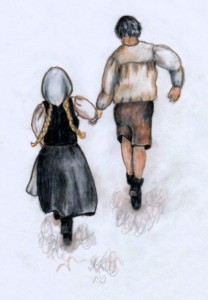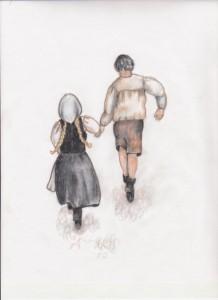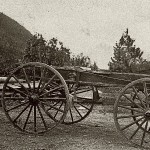PART 1 –THE DREAM
Prologue
The window slammed, waking the elderly woman from a very sound sleep, a most unusual occurrence.
“I’m sorry, Gran, I didn’t realize you were still asleep. You must have slept very soundly – didn’t you hear the thunder?” the young woman asked cheerily, as she glanced at her grandmother with incredibly bright, china blue eyes.
Opening her eyes again, their own intense blue now fading but still shockingly bright, the old lady smiled gently at her granddaughter. “I do sleep! Pretty good for ninety-six year! I don’t hear no tunder.”
“It’s still really early, Gran, why don’t you go back to sleep – that’s what I’m going to do,” Sonya whispered softly.
“Thank you Sonya,” Maria replied with a sigh. “I am tired. I will sleep for little vile.”
Stepping quietly, Sonya left the room and closed the door. Her grandmother was such a special person. She loved living with her. It had worked out so well for both of them. She was able to take a break from university and decide what she really wanted to do with her life, and her grandmother had company while her aunt and uncle were away on their two-month Australian adventure.
Sonya had always been close to her grandmother and marveled at her outlook on life. Her cousin, James, teased that as the youngest of the many grandchildren, she was her grandmother’s favourite, but Sonya didn’t see it that way.
Being the youngest of the cousins, she was the one that was around the most. The others were all busy with their lives, careers and marriages. That was the reason why she and Gran were so close.
Maria glanced benevolently at her granddaughter’s departing back, pulled the covers over her shoulder, closed her eyes and sighed, drifting back into a deep, deep sleep.
NOTE: All dialogue in italics is spoken in a language other than English. This story is purely fictional and any similarity to individuals living or dead is coincidental and not intended. Some small liberty has been taken with a portion of the history of the Creston area.
“Maruska! Maruska! Wait for me!” a voice shouted from behind her. Impatiently, the small girl with hair the colour of pale, ripe wheat, stopped as her friend Mikael ran down the dusty road after her, his feet kicking up puffs of dust as his raven locks bounced with every step. Three years older than she, he was already beginning to look less like an awkward, thin boy and growing taller and heavier. He caught up to her and pulled her braided hair, dark brown eyes twinkling with merriment.
“Do not call me Maruska! You know very well that my name is Maria!” she declared, her hands snapping onto her hips, a stomp of her foot showing her displeasure. A puff of dust seemingly emphasized her annoyance, as her intense blue eyes flashed with her righteous eight year-old indignation directed at Mikael.
Dark eyes still sparkling, Mikael simply ignored her irritation. “I like Maruska better! I have news. We must get back to the village. Father Jakob said there are soldiers coming and we must get inside,” he declared with an emphatic nod of his head, feeling very important and grown up.
“Good soldiers or bad soldiers?” Maria asked, fear beginning to seize her.
Mikael shrugged his shoulders. “If Father Jakob warns us to go inside, I think bad.”
Clutching onto her hand, he led her across a field, and taking a shortcut back to their village, they began to run. Maria knew her mother would be upset she hadn’t reached her grandmother’s house, but everyone listened to Father Jakob. He was the only able bodied man left in the village. Except for the elderly men and boys, all the adult men had been conscripted into the army. It was 1912 and the big war was raging around them. Tucked into the western corner of Ukraine, at least they didn’t seem to be in the mainstream of the war, for which they were truly grateful.
However, this left the village unprotected and in Carpathia, that meant it was available to whichever country wished to possess it. With its fertile rolling hills and temperate climate, it was surrounded by Hungary, Czechoslovakia, Romania and Poland. And it was an undefended, desirable commodity.
Since long before Maria’s father and brother had been conscripted into the army, they had been under Hungarian and Czech rule, and it had been peaceful. Although business was conducted in Hungarian or Czech, whichever the case might be, the villagers still spoke their native Ukrainian language, living side by side with their neighbours without difficulty. That was about to change.
Running as fast as their legs could carry them, Mikael and Maria finally reached their village, horrified to find rows of soldiers marching down the main street, preventing them from safely reaching their homes.
Quickly turning onto a side street, Mikael led Maria behind the houses and they meticulously crept down a street parallel to the main street. Silently and fearfully, they crawled through the graveyard, ducking behind tombstones along their way. They could see the village church, its worn copper roof glowing dull green in the afternoon sun. It was their best option for sanctuary.
Finally arriving at the church, they quietly slid in through the side door, relieved to be safe, at least for the time being. That relief was short-lived.
An arm reached out and grabbed Mikael’s shoulder. Inhaling their screams, both turned in terror, eyes opened wide in the horror of what might await them.
Mikael tightened his hold on Maria’s hand, prepared to run, but not knowing where, or how. His heart was pounding so hard he was certain that it would thump out of his chest.
Putting his fingers to his lips, Father Jakob urged them to be silent, motioning them to follow him. The sound of soldiers’ marching boots became louder and louder as Father Jakob led them to the loft and hid them behind the organ.
He then returned to the front of his church and knelt to pray at the altar. The doors to the church flew open and half a dozen soldiers marched up the aisle. Crossing himself, Father Jakob took a deep breath and then bravely turned to face the soldiers.
“This belongs to us now,” a soldier declared loudly in Romanian.
“This church belongs to all of God’s children,” Father Jakob calmly replied in fluent Romanian. “All of God’s children are welcome here.”
The soldier appeared to be at a loss as to how to answer the priest, when an officer appeared. “This village is now the property of Romania. Ring the church bells and call the people here,” the officer ordered. Father Jakob viewed the soldiers with trepidation, certain that the villagers would be harmed if they were summoned to the church.
“Immediately!” the officer ordered imperiously.
Apparently, Father Jakob didn’t move quite quickly enough for the officer, who impatiently pulled out a pistol and took aim, coldly shooting the priest who stood before him. The noise of the gunshot echoed deafeningly throughout the small church.
After a sudden jerk, Father Jakob stood motionless for what seemed to be an eternity, his hand clutching his chest in an attempt to stem the gush of blood. He silently slumped to the floor, dying where he fell. His blood slowly seeped along the worn floorboards of what had been his church.
Two horror-stricken children witnessed Father Jakob’s murder from their vantage point behind the organ. Their hearts were beating so hard, they were terrified the soldiers could hear them booming through out their church. Gripping onto each other’s hands, frozen in fear and shock, they assumed that they, too, would be shot like Father Jakob, whose blood they could see in a widening pool on the wooden planks of the centre aisle where his motionless body lay.
Two soldiers were ordered to ring the church bells and soon the sound of their deep tones pealed into the now excruciating silence of the afternoon.
One by one the villagers appeared, cautiously, fearing that once again their language and life were about to change, and they assumed not for the better. They were absolutely correct.
As the church began to fill, Maria and Mikael crept down the stairs from the loft as silently as they could, unnoticed by the soldiers, busily shepherding the village people into the church. They were easily able to slip through the now crowded church and join their families.
Maria’s mother tried not to show her immense relief at seeing her young daughter unharmed and shifting the weight of her five-year-old sister to her other hip, she thankfully pulled her daughter close. Mikael’s mother put her arm around his shoulder, her eyes filling with tears of happiness and concern.
Both families then stood side by side with the rest of the villagers, fearing the soldiers and their guns, alarmingly aware of the red-rust stain along the wooden floor of Father Jakob’s church. If the soldiers could shoot Father Jakob in cold blood, there was no doubt in their minds that they wouldn’t hesitate to shoot anyone who disagreed with them.
The Romanian officer made his decree to the assembled women, children and elderly that from that moment on, the only language permitted would be Romanian. Slowly the villagers left the church to return to their homes, avoiding looking at the soldiers lining the road.
Maria and Mikael nodded at each other. No words needed to be said. The villagers would very soon become accustomed to an almost imperceptible language of nods and expressions, unable to speak their language to one another; most not knowing the one that they were obligated to speak.
Thus, the winter came and went. School was taught in Romanian and although it was extremely difficult at first, these resilient people conducted their lives in Romanian. Such were the times.
These people were considered unwelcome in their own land. Life was not made easy for them. They knew little of the ‘big war’ their men were fighting; they were doing their utmost simply to survive at home.
It was 1913 and they were afraid, and with good reason. Soldiers were everywhere and often brutal. A night of drinking by the soldiers was sure to find all the village dogs and cats that were unfortunate enough to be out shot to death for fun. If the villagers looked at the soldiers in the wrong way, they were beaten.
Maria continued to walk to the neighbouring village to visit her grandmother once a week to bring her vegetables from the garden, but now Mikael walked with her. For some reason, the soldiers seemed unperturbed by the small blonde girl and the dark-haired boy that regularly walked the dusty road to the next village and, thankfully, allowed them to pass without incident.
Since that day in the loft of the church, they had become best friends, their common terror forging a bond that only grew stronger with time. Their friendship was absolute. They trusted on another with even their most secret thoughts. Their experience in the church seemed to have fused their souls. They were inseparable.







 CODE:
CODE: 

